Unit 5 Topic 3 My school life is very interesting. Section D课件(29张PPT内嵌音频)
文档属性
| 名称 | Unit 5 Topic 3 My school life is very interesting. Section D课件(29张PPT内嵌音频) | 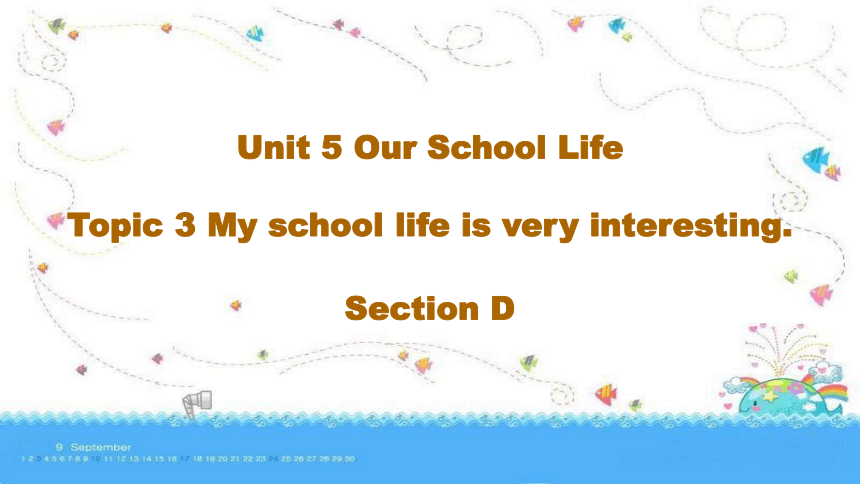 | |
| 格式 | pptx | ||
| 文件大小 | 35.3MB | ||
| 资源类型 | 教案 | ||
| 版本资源 | 仁爱科普版 | ||
| 科目 | 英语 | ||
| 更新时间 | 2022-03-15 21:14:14 | ||
图片预览

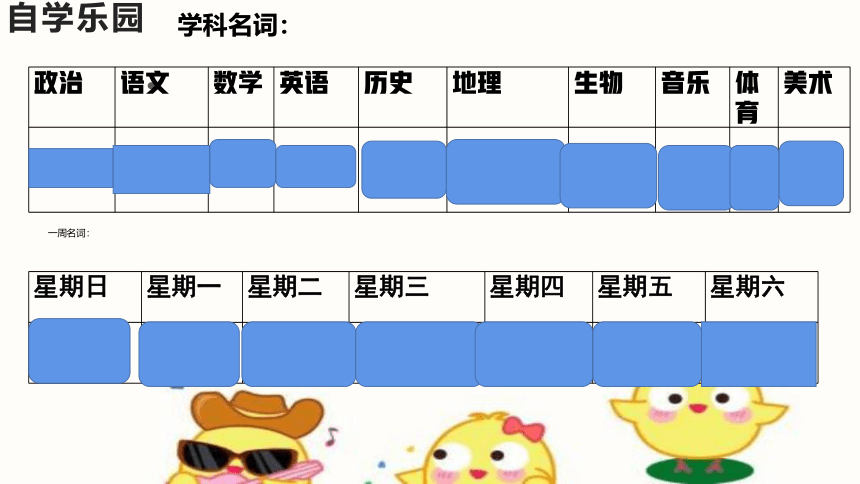
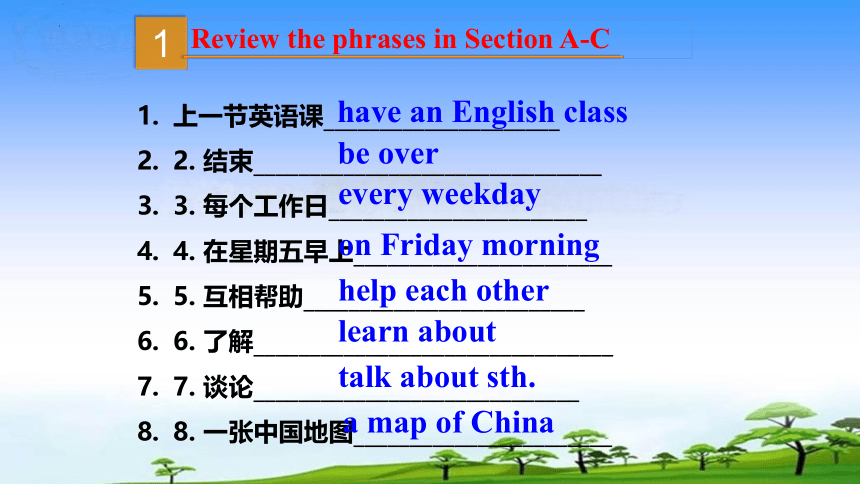
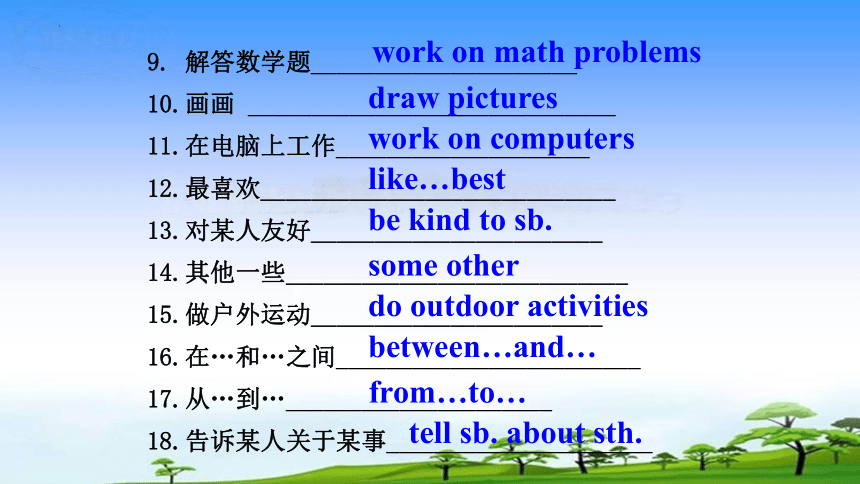
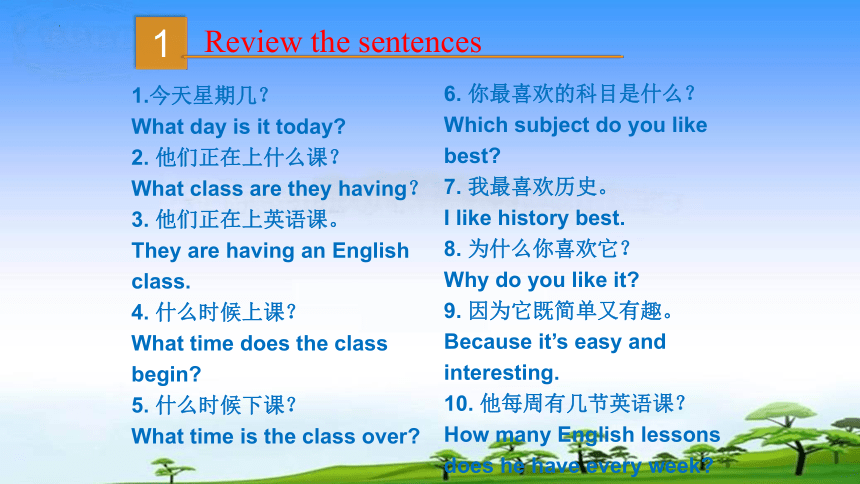
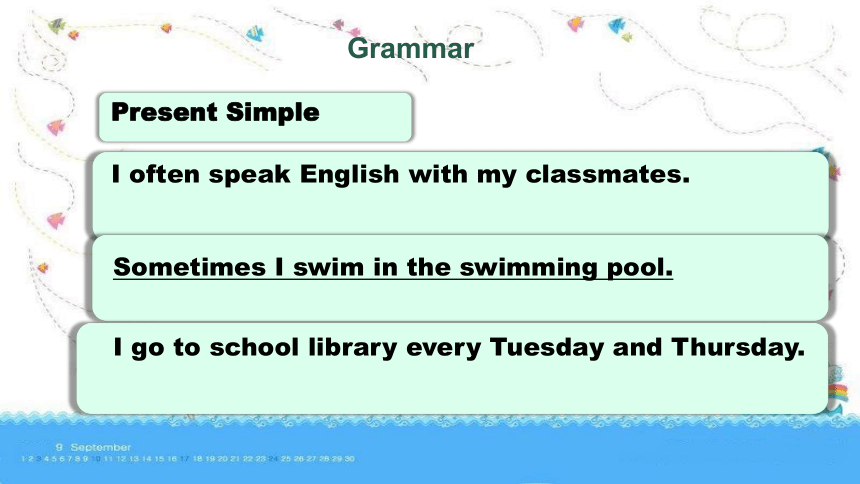
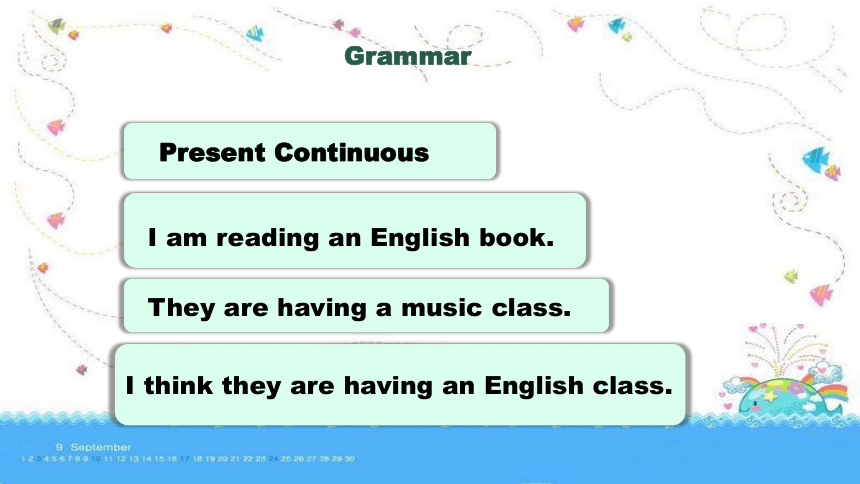
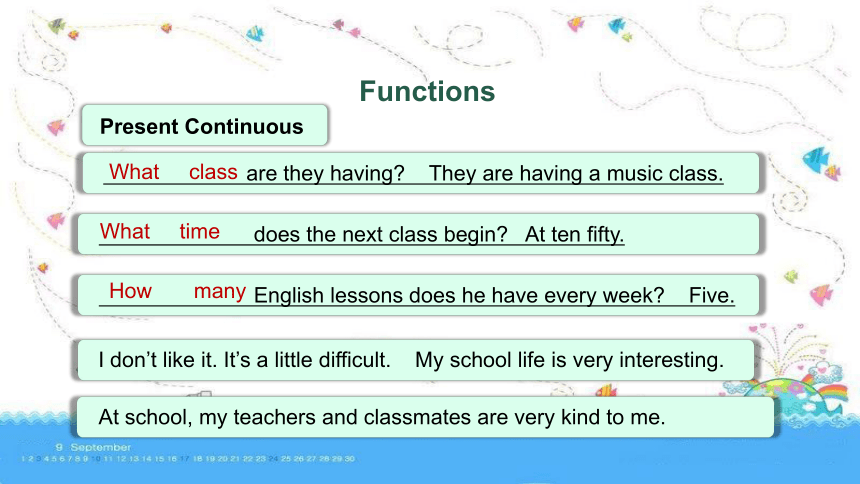
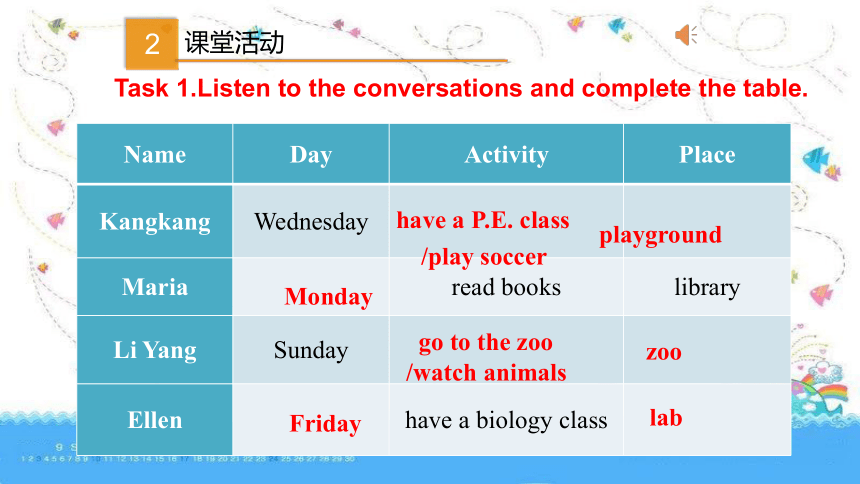
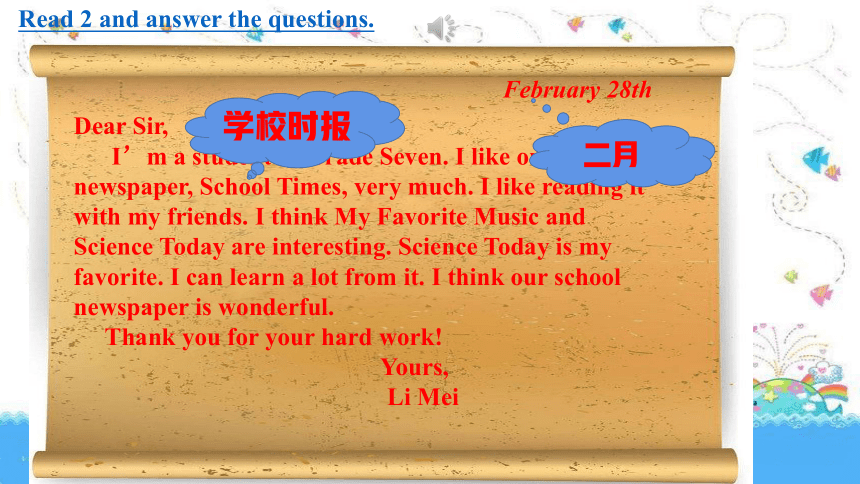
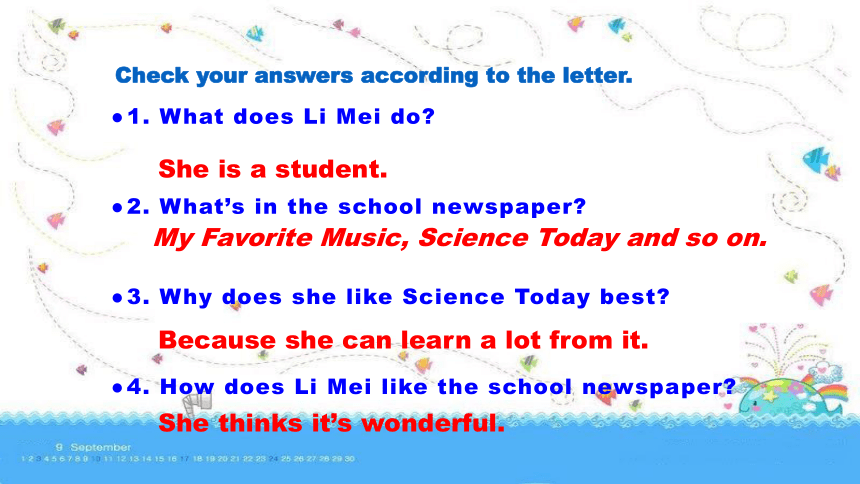

文档简介
(共31张PPT)
Section D
Unit 5 Our School Life
Topic 3 My school life is very interesting.
自学乐园
学科名词:
政治 语文 数学 英语 历史 地理 生物 音乐 体育 美术
Politics Chinese Math English History Geography Biology Music P.E.
Art
一周名词:
星期日 星期一 星期二 星期三 星期四 星期五 星期六
Sunday Monday Tuesday Wednesday Thursday Friday Saturday
上一节英语课_____________________
2. 结束_______________________________
3. 每个工作日_______________________
4. 在星期五早上_______________________
5. 互相帮助_________________________
6. 了解________________________________
7. 谈论_____________________________
8. 一张中国地图_______________________
have an English class
be over
every weekday
on Friday morning
help each other
learn about
talk about sth.
a map of China
Review the phrases in Section A-C
1
9. 解答数学题_____________________
10.画画 _____________________________
11.在电脑上工作____________________
12.最喜欢____________________________
13.对某人友好_______________________
14.其他一些___________________________
15.做户外运动_______________________
16.在…和…之间________________________
17.从…到…_____________________
18.告诉某人关于某事_____________________
work on math problems
draw pictures
work on computers
like…best
be kind to sb.
some other
do outdoor activities
between…and…
from…to…
tell sb. about sth.
1.今天星期几?
What day is it today
2. 他们正在上什么课?
What class are they having?
3. 他们正在上英语课。
They are having an English class.
4. 什么时候上课?
What time does the class begin
5. 什么时候下课?
What time is the class over
6. 你最喜欢的科目是什么?
Which subject do you like best
7. 我最喜欢历史。
I like history best.
8. 为什么你喜欢它?
Why do you like it
9. 因为它既简单又有趣。
Because it’s easy and interesting.
10. 他每周有几节英语课?
How many English lessons does he have every week
1
Review the sentences
Grammar
Present Simple
I often speak English with my classmates.
Sometimes I swim in the swimming pool.
I go to school library every Tuesday and Thursday.
Grammar
Present Continuous
I am reading an English book.
They are having a music class.
I think they are having an English class.
Functions
Present Continuous
are they having They are having a music class.
does the next class begin At ten fifty.
I don’t like it. It’s a little difficult. My school life is very interesting.
At school, my teachers and classmates are very kind to me.
What class
What time
English lessons does he have every week Five.
How many
Name Day Activity Place
Kangkang Wednesday
Maria read books library
Li Yang Sunday
Ellen have a biology class
have a P.E. class
/play soccer
playground
go to the zoo /watch animals
Monday
Friday
zoo
lab
Task 1.Listen to the conversations and complete the table.
2
课堂活动
Dear Sir,
I’m a student in Grade Seven. I like our school newspaper, School Times, very much. I like reading it with my friends. I think My Favorite Music and Science Today are interesting. Science Today is my favorite. I can learn a lot from it. I think our school newspaper is wonderful.
Thank you for your hard work!
Yours,
Li Mei
Read 2 and answer the questions.
February 28th
二月
学校时报
1. What does Li Mei do
2. What’s in the school newspaper
3. Why does she like Science Today best
4. How does Li Mei like the school newspaper
Check your answers according to the letter.
She is a student.
My Favorite Music, Science Today and so on.
Because she can learn a lot from it.
She thinks it’s wonderful.
I can learn a lot from it.
learn sth. from sth.意为“从……中学习……”
我可以从中学到很多东西。
e.g. We can learn much from the geography book.
e.g. We can learn cooking from the cook.
learn sth. from sb. 意为“向某人学习……”
a lot是副词短语,修饰learn,表示学的程度。反义词是a little。
Thank you for your hard work!
thank sb. for...表示“因.......而感谢某人”,
后面跟名词或v-ing形式。
谢谢你的辛勤工作!
e.g. We thank you for all your help.
e.g. I thank them for coming to my birthday party.
e.g. Thanks for listening.
thanks for...也可以表示“因为..…而感谢某人”,
for为介词,后接名词或v-ing ,表示感谢的理由。
例:1.谢谢你们的爱。(完成译句)
Thank you for_________ __________.
Thank you for_________ ___________.
your
love
loving
me
Thank you for your hard work!
hard在句中为形容词,意为“努力的,辛苦的” 。
谢谢你的辛勤工作!
hard意为“努力地,辛苦地”,还可以做副词 。
e.g. It’s hard to finish my work on time.
hard做形容词,还可以表示“困难的,猛烈的” 。
e.g. She works hard. And her hard work made me satisfied.
例:
1.我们必须努力学习英语。(完成译句)
We must __________ __________ at English.
2.我认为这是一份艰苦的工作。(完成译句)
I think it is _________ __________.
work
hard
hard
work
一般现在时和现在进行时的区别
拓 展
1. 概念不同: 一般现在时表示主语经常性和习惯性的动作或存在的状态,也表示说话者的能力及自然现象。
现在进行时表示说话时(瞬间)正在进行的动作,也表示目前或现阶段一直进行的动作。
e.g. She often does her homework in the evening.
e.g. She is doing her homework now.
拓 展
2. 构成方式不同:
一般现在时谓语动词的构成:
①be动词的一般现在时形式: am, is, are
②动词have 的一般现在时形式: have, has
③其他行为动词的一般现在时形式有动词原形或第三人称单数形式
现在进行时谓语动词的构成: am/is/are+动词的-ing形式(现在分词)。
一般现在时和现在进行时的区别
拓 展
3. 时间状语不同:
一般现在时的时间状语主要有:
always, usually, often, sometimes, never, every day/week/month/year, on Sundays, in the morning/afternoon/evening 等。
现在进行时的时间状语主要有:
now, these days, this week, at the moment等,有时句首有“Look! ”; “Listen!”等提醒对方注意的词句存在。
一般现在时和现在进行时的区别
时态 定义 标志词 结构
一般现在时 现在的状态或者经常性、习惯性发生的动作 1. 频率副词:always, usually, often, sometimes, seldom,never. 2. 频率副词词组:once/twice a day, three times a week, every... 主+be(am/is/are)+...
主+V原/三单+...
否:
一般:
特殊:
现在进行时 正在发生或者进行的动作 now, look, listen, at the monment,上下文 主+be+doing+...
否:
一般:
特殊:
Present Simple vs Present Continuous
一、特殊疑问句:是以特殊疑问词开头的疑问句。
回答问题时,不可以用yes 或no 来回答。
它的句型:疑问词+ 一般疑问句(但提问主语或主语的定语时,用陈述句语序。)
常用的疑问词有:
What,Who,Where,When,Why, Which,How,How often,What time/ day/ subject/ else,How long,How far
语法梳理
1. 以What,Who,Where,When,Why,Which开头引导的疑问句及答句:
⑴—__________ is it today “今天星期几?”
—It is Wednesday.“今天星期三。”
⑵—__________ are they having
“他们在上什么课?”
—They are having a music class.
“他们在上音乐课。”
⑶—__________ are you reading “你在看什么书?”
—I am reading an English book.“我在看英语书。”
What day
What class
What book
⑷—_________ does the class begin “几点开始上课?”
—At ten o’clock. ”十点。”
⑸—_____is your favorite subject “你最喜欢什么科目?”
= Which subject do you like best
—My favorite subject is English.=________________
“我最喜欢英语。”
⑹—_____ do/don’t you like English
“你为什么喜欢/不喜欢英语?”
—Because it’s easy and interesting.
“因为它既容易又有趣。”
—Because it’s difficult and boring.
“因为它既难又乏味。”
What time
What
I like English best.
Why
以how开头引导的疑问句及答句:
词组 含义 用法 答语
how much 多少 ①提问不可数名词的数量 ②提问价格 ①数词(+量词)
②价格
how many 多少 提问可数名词的数量 数词(+量词)
how long ①多长 ②多久 ①提问物体的长度 ②提问一段时间 ①物体长度
②for + —段时间/
since短语或从句
how soon 多久以后 提问某个动作多长时间后发生或结束 in +一段时间
how far 多远 提问距离 数词(+量词)
how often 多久一次 提问频率 频度副词
⑴—_________ English lessons do you have every week
“你每周上几节英语课?”
—Five lessons.“五节。”
⑵—_________ water do you need “你需要多少水?”
—I need a bottle of water. “我需要一瓶水。”
⑶—_________ is the milk “牛奶多少钱?”
—Two yuan a bottle. “一瓶两元。”
⑷—_________ can I keep them “我可以借多久?”
—(For) two weeks. “两周。”
How many
How much
How much
How long
⑸—__________ do you go to the library
”你多久去一趟图书馆?”
—Very often. ”经常去。”
⑹—______ do you usually go to school
”你通常如何去上学?”
—I usually go to school by bike. ”我通常骑车上学。”
⑺—______ do you _____ the newspaper
“你觉得这报纸如何?”
=_______ do you ____ ____ the newspaper
—It’s wonderful. ”非常好。”
How often
How
How like
What think of
自测
翻译重点句:
①谢谢你的努力工作。
Thank you for your hard work!
②我每周二和四都去学校图书馆.
I go to the school library every Tuesday and Thursday.
③我有时候在游泳池游泳
Sometimes I swim in the swimming pool.
④我正在读英语书
I am reading an English book.
⑤我正在上音乐课
They are having a music class.
⑥他们正在上什么课
What class are they having
⑦下节课几点上课?
What time does the next class begin
⑧老师和同学对我很友好.
My teachers and classmates are kind to me.
⑨今天星期几
What day is it today .
1. Read the following passage about the study habits, paying attention to the words, such as never, often and seldom.
I usually do my homework after supper. When I study English, I never listen to English CDs. Sometimes I use a dictionary to learn new English words. I also always study English grammar. But I seldom speak English after class. I really should speak English more often. I usually read English stories every week, and I always write new sentences every day.
Project
2. Write a passage about your own study habits with the words in the box.
Usually, never, sometimes, always, seldom, often
Project
学习习惯是长期性的,通常用一般现在时。
We learn:
3
课堂小结
We learn:
We can:
1. some words: February, hard
2. some phrases: learn … from… thank you for …
3. some sentences:
I can learn a lot from it.
Thank you for your hard work.
1. know the differences between the Present Simple and the Present Continuous
e.g. They usually have lunch at school.
I am reading an English book.
2. use the adverbs of frequency more correctly
e.g. never, often, seldom
Section D
Unit 5 Our School Life
Topic 3 My school life is very interesting.
自学乐园
学科名词:
政治 语文 数学 英语 历史 地理 生物 音乐 体育 美术
Politics Chinese Math English History Geography Biology Music P.E.
Art
一周名词:
星期日 星期一 星期二 星期三 星期四 星期五 星期六
Sunday Monday Tuesday Wednesday Thursday Friday Saturday
上一节英语课_____________________
2. 结束_______________________________
3. 每个工作日_______________________
4. 在星期五早上_______________________
5. 互相帮助_________________________
6. 了解________________________________
7. 谈论_____________________________
8. 一张中国地图_______________________
have an English class
be over
every weekday
on Friday morning
help each other
learn about
talk about sth.
a map of China
Review the phrases in Section A-C
1
9. 解答数学题_____________________
10.画画 _____________________________
11.在电脑上工作____________________
12.最喜欢____________________________
13.对某人友好_______________________
14.其他一些___________________________
15.做户外运动_______________________
16.在…和…之间________________________
17.从…到…_____________________
18.告诉某人关于某事_____________________
work on math problems
draw pictures
work on computers
like…best
be kind to sb.
some other
do outdoor activities
between…and…
from…to…
tell sb. about sth.
1.今天星期几?
What day is it today
2. 他们正在上什么课?
What class are they having?
3. 他们正在上英语课。
They are having an English class.
4. 什么时候上课?
What time does the class begin
5. 什么时候下课?
What time is the class over
6. 你最喜欢的科目是什么?
Which subject do you like best
7. 我最喜欢历史。
I like history best.
8. 为什么你喜欢它?
Why do you like it
9. 因为它既简单又有趣。
Because it’s easy and interesting.
10. 他每周有几节英语课?
How many English lessons does he have every week
1
Review the sentences
Grammar
Present Simple
I often speak English with my classmates.
Sometimes I swim in the swimming pool.
I go to school library every Tuesday and Thursday.
Grammar
Present Continuous
I am reading an English book.
They are having a music class.
I think they are having an English class.
Functions
Present Continuous
are they having They are having a music class.
does the next class begin At ten fifty.
I don’t like it. It’s a little difficult. My school life is very interesting.
At school, my teachers and classmates are very kind to me.
What class
What time
English lessons does he have every week Five.
How many
Name Day Activity Place
Kangkang Wednesday
Maria read books library
Li Yang Sunday
Ellen have a biology class
have a P.E. class
/play soccer
playground
go to the zoo /watch animals
Monday
Friday
zoo
lab
Task 1.Listen to the conversations and complete the table.
2
课堂活动
Dear Sir,
I’m a student in Grade Seven. I like our school newspaper, School Times, very much. I like reading it with my friends. I think My Favorite Music and Science Today are interesting. Science Today is my favorite. I can learn a lot from it. I think our school newspaper is wonderful.
Thank you for your hard work!
Yours,
Li Mei
Read 2 and answer the questions.
February 28th
二月
学校时报
1. What does Li Mei do
2. What’s in the school newspaper
3. Why does she like Science Today best
4. How does Li Mei like the school newspaper
Check your answers according to the letter.
She is a student.
My Favorite Music, Science Today and so on.
Because she can learn a lot from it.
She thinks it’s wonderful.
I can learn a lot from it.
learn sth. from sth.意为“从……中学习……”
我可以从中学到很多东西。
e.g. We can learn much from the geography book.
e.g. We can learn cooking from the cook.
learn sth. from sb. 意为“向某人学习……”
a lot是副词短语,修饰learn,表示学的程度。反义词是a little。
Thank you for your hard work!
thank sb. for...表示“因.......而感谢某人”,
后面跟名词或v-ing形式。
谢谢你的辛勤工作!
e.g. We thank you for all your help.
e.g. I thank them for coming to my birthday party.
e.g. Thanks for listening.
thanks for...也可以表示“因为..…而感谢某人”,
for为介词,后接名词或v-ing ,表示感谢的理由。
例:1.谢谢你们的爱。(完成译句)
Thank you for_________ __________.
Thank you for_________ ___________.
your
love
loving
me
Thank you for your hard work!
hard在句中为形容词,意为“努力的,辛苦的” 。
谢谢你的辛勤工作!
hard意为“努力地,辛苦地”,还可以做副词 。
e.g. It’s hard to finish my work on time.
hard做形容词,还可以表示“困难的,猛烈的” 。
e.g. She works hard. And her hard work made me satisfied.
例:
1.我们必须努力学习英语。(完成译句)
We must __________ __________ at English.
2.我认为这是一份艰苦的工作。(完成译句)
I think it is _________ __________.
work
hard
hard
work
一般现在时和现在进行时的区别
拓 展
1. 概念不同: 一般现在时表示主语经常性和习惯性的动作或存在的状态,也表示说话者的能力及自然现象。
现在进行时表示说话时(瞬间)正在进行的动作,也表示目前或现阶段一直进行的动作。
e.g. She often does her homework in the evening.
e.g. She is doing her homework now.
拓 展
2. 构成方式不同:
一般现在时谓语动词的构成:
①be动词的一般现在时形式: am, is, are
②动词have 的一般现在时形式: have, has
③其他行为动词的一般现在时形式有动词原形或第三人称单数形式
现在进行时谓语动词的构成: am/is/are+动词的-ing形式(现在分词)。
一般现在时和现在进行时的区别
拓 展
3. 时间状语不同:
一般现在时的时间状语主要有:
always, usually, often, sometimes, never, every day/week/month/year, on Sundays, in the morning/afternoon/evening 等。
现在进行时的时间状语主要有:
now, these days, this week, at the moment等,有时句首有“Look! ”; “Listen!”等提醒对方注意的词句存在。
一般现在时和现在进行时的区别
时态 定义 标志词 结构
一般现在时 现在的状态或者经常性、习惯性发生的动作 1. 频率副词:always, usually, often, sometimes, seldom,never. 2. 频率副词词组:once/twice a day, three times a week, every... 主+be(am/is/are)+...
主+V原/三单+...
否:
一般:
特殊:
现在进行时 正在发生或者进行的动作 now, look, listen, at the monment,上下文 主+be+doing+...
否:
一般:
特殊:
Present Simple vs Present Continuous
一、特殊疑问句:是以特殊疑问词开头的疑问句。
回答问题时,不可以用yes 或no 来回答。
它的句型:疑问词+ 一般疑问句(但提问主语或主语的定语时,用陈述句语序。)
常用的疑问词有:
What,Who,Where,When,Why, Which,How,How often,What time/ day/ subject/ else,How long,How far
语法梳理
1. 以What,Who,Where,When,Why,Which开头引导的疑问句及答句:
⑴—__________ is it today “今天星期几?”
—It is Wednesday.“今天星期三。”
⑵—__________ are they having
“他们在上什么课?”
—They are having a music class.
“他们在上音乐课。”
⑶—__________ are you reading “你在看什么书?”
—I am reading an English book.“我在看英语书。”
What day
What class
What book
⑷—_________ does the class begin “几点开始上课?”
—At ten o’clock. ”十点。”
⑸—_____is your favorite subject “你最喜欢什么科目?”
= Which subject do you like best
—My favorite subject is English.=________________
“我最喜欢英语。”
⑹—_____ do/don’t you like English
“你为什么喜欢/不喜欢英语?”
—Because it’s easy and interesting.
“因为它既容易又有趣。”
—Because it’s difficult and boring.
“因为它既难又乏味。”
What time
What
I like English best.
Why
以how开头引导的疑问句及答句:
词组 含义 用法 答语
how much 多少 ①提问不可数名词的数量 ②提问价格 ①数词(+量词)
②价格
how many 多少 提问可数名词的数量 数词(+量词)
how long ①多长 ②多久 ①提问物体的长度 ②提问一段时间 ①物体长度
②for + —段时间/
since短语或从句
how soon 多久以后 提问某个动作多长时间后发生或结束 in +一段时间
how far 多远 提问距离 数词(+量词)
how often 多久一次 提问频率 频度副词
⑴—_________ English lessons do you have every week
“你每周上几节英语课?”
—Five lessons.“五节。”
⑵—_________ water do you need “你需要多少水?”
—I need a bottle of water. “我需要一瓶水。”
⑶—_________ is the milk “牛奶多少钱?”
—Two yuan a bottle. “一瓶两元。”
⑷—_________ can I keep them “我可以借多久?”
—(For) two weeks. “两周。”
How many
How much
How much
How long
⑸—__________ do you go to the library
”你多久去一趟图书馆?”
—Very often. ”经常去。”
⑹—______ do you usually go to school
”你通常如何去上学?”
—I usually go to school by bike. ”我通常骑车上学。”
⑺—______ do you _____ the newspaper
“你觉得这报纸如何?”
=_______ do you ____ ____ the newspaper
—It’s wonderful. ”非常好。”
How often
How
How like
What think of
自测
翻译重点句:
①谢谢你的努力工作。
Thank you for your hard work!
②我每周二和四都去学校图书馆.
I go to the school library every Tuesday and Thursday.
③我有时候在游泳池游泳
Sometimes I swim in the swimming pool.
④我正在读英语书
I am reading an English book.
⑤我正在上音乐课
They are having a music class.
⑥他们正在上什么课
What class are they having
⑦下节课几点上课?
What time does the next class begin
⑧老师和同学对我很友好.
My teachers and classmates are kind to me.
⑨今天星期几
What day is it today .
1. Read the following passage about the study habits, paying attention to the words, such as never, often and seldom.
I usually do my homework after supper. When I study English, I never listen to English CDs. Sometimes I use a dictionary to learn new English words. I also always study English grammar. But I seldom speak English after class. I really should speak English more often. I usually read English stories every week, and I always write new sentences every day.
Project
2. Write a passage about your own study habits with the words in the box.
Usually, never, sometimes, always, seldom, often
Project
学习习惯是长期性的,通常用一般现在时。
We learn:
3
课堂小结
We learn:
We can:
1. some words: February, hard
2. some phrases: learn … from… thank you for …
3. some sentences:
I can learn a lot from it.
Thank you for your hard work.
1. know the differences between the Present Simple and the Present Continuous
e.g. They usually have lunch at school.
I am reading an English book.
2. use the adverbs of frequency more correctly
e.g. never, often, seldom
同课章节目录
- Unit 5 Our school life
- Topic 1 I usually come to school by subway.
- Topic 2 A few students are running around the play
- Topic 3 My school life is very interesting.
- Unit 6 Our local area
- Topic 1 Is there a computer in your study?
- Topic 2 My home is in an apartment building.
- Topic 3 Which is the way to the hospital?
- Review of Units 5-6
- Unit 7 The Birthday
- Topic 1 When is your birthday?
- Topic 2 Can you sing an English song?
- Topic 3 Everyone had a good time.
- Unit 8 The seasons and the Weathe
- Topic 1 What's the weather like in summer?
- Topic 2 The summer holidays are coming.
- Topic 3 Let’s celebrate!
- Review of Units 7-8
- 旧版资料
- Unit 5 Our School Life
- Unit 6 Our Local Area
- Unit 7 The Birthday
- Unit 8 The seasons and the Weathe
- Unit 7 Celebrating the Birthday(老版本)
